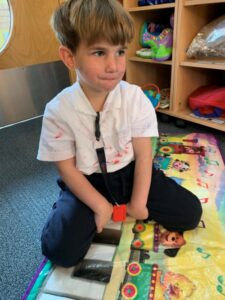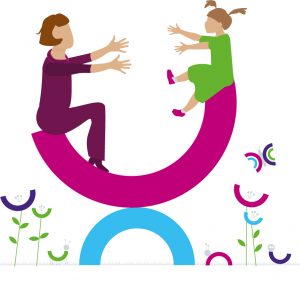Is it autism?
Children and their families across the country are experiencing significant waits for an autism assessment and possible diagnosis. Here we explain more about what the NHS and its partners are doing to see children faster and the help that’s out there
Rapid diagnosis means Noah has the support he needs

“It was a bitter sweet moment when Noah was diagnosed with autistic spectrum disorder. It’s not a diagnosis anyone wants, but at the same time, I was so relieved for it to be confirmed.”
By Noah’s first birthday mum Amy Allaway knew there was something amiss. But with Noah being born during a Covid lockdown, the pair hadn’t been able to socialise much and Amy was unable to compare her experience with other new parents.
Initially, she accepted being told that children develop at different speeds. Noah also had an operation for hearing issues and Amy was told she’d notice a difference soon after that. But when she didn’t, and having carried out a lot of research, first-time mum Amy was sure her little one had ASD.
She then discovered that across the country many parents can wait years for a diagnosis – but thanks to a trial of a new way of working at Kent Community Health NHS Foundation Trust, for those children who display for obvious symptoms, Noah was instead diagnosed very quickly.
The now three-year-old was referred to Consultant Paediatrician Dr Sunil Bhide, who was able to give a diagnosis right there and then, on Noah’s first appointment.
Amy, 28, a teacher, who lives in Dartford, said: “When he said I can do it today, I was amazed. Until then, everything had been such a battle.
“I burst into tears when he said it was ASD. It sounds strange, but it was a relief. I already knew, but for someone to confirm it.
“I know there is no cure. But the diagnosis makes everything so much easier. I can now get Noah the help he needs. With the diagnosis, I will be able to get an Educational Health Care Plan for Noah, which means I can then get him one-to-one help at his nursery school, helping him to interact. He plays alone, due to children with ASD finding it difficult to communicate and socialise.
“I really feel for parents who have to wait two years for a diagnosis. They shouldn’t have to wait that long. I am so grateful to Dr Bhide for helping us so quickly.”
This pilot is only available for children who display more obvious signs of autism.
Finally, my voice was heard

Another child who was able to have a rapid diagnosis was four-year-old Tommy Rasho.
Tommy has tuberous sclerosis complex and medics told mum Rebeca, there would be a 40-50 per cent chance he would have ASD, as well as a 60-90 per cent chance of epilepsy.
Rebecca, from Gravesend, who is also a teacher, said: “As he was my third child I knew something was wrong, but I was dismissed by everyone. I was told he was just lazy because his siblings did things for him and that all children develop at different rates.
“But I knew he had ASD and complete strangers would say to me that he was autistic, he showed classic signs.
“A neuro-disability consultant at Evelina London Children’s Hospital had written a report saying it was very likely, but I needed to get a confirmed diagnosis locally. When I saw Dr Bhide I felt my voice was heard. Within minutes, he could see and gave me the diagnosis.
“You don’t want a label for your child, but it does mean you can then access services for them.”
With the diagnosis, Rebecca was able to secure Tommy a place at a special needs school and hopes it will be easier to access other support.
Working in new ways to diagnose ASD faster
As part of improvement work we have going on across our trust, we held a trial to rapidly diagnose children with ASD, in cases where specific criteria had already been met.
We took a close look at how things are done, with the aim of reducing wait times and the number of family clinic appointments between referral and diagnosis.
KCHFT’s Dr Bhide worked on the project with Dr Zoe Field, from East Kent Hospitals University NHS Foundation Trust and Dr Emma Smith from Medway NHS Foundation Trust.
The trial saw average time from referral to formal diagnosis drop from 24.7 months, using conventional ways of working, to 12.9 months when the new way was used. The time families needed to spend in clinic appointments was almost halved. This was achieved by removing the need for professionals from different fields needing to carrying out the child’s assessment together, in the same room and instead, the consultant paediatrician having a detailed report from another health professional to hand and then being able to confirm the diagnosis.
Dr Bhide said: “We want to improve waiting lists and make it a better experience for families. Diagnosis has been done the same way for years and we wanted to challenge the way it is carried out, to make it quicker. This helps families to access appropriate support sooner and reduces emotional distress and uncertainty.
“Next we will be getting parent feedback, speaking with stakeholders and seeing if we can do things differently in the future, while adhering to NICE guidelines and best practice.”
A heartfelt apology was given to children, their parents and families by everyone involved in supporting children with special education needs across the county in November.
You may have seen the coverage from the Ofsted and Care Quality Commission inspection into care provided to children with special education needs (SEND) across the county and we know we all – Kent County Council, NHS Kent and Medway, local schools and settings – want to do better for the children and families.
Kent Community Health NHS Foundation Trust’s Community Paediatrics Service provides diagnosis for children with a range of conditions in west Kent, Gravesham and Swanley.
Like the rest of the country, waiting times for this service have increased due to the Covid pandemic. In particular, the wait for an autism spectrum disorder assessment is now between 36 to 42 months for those children who need a full assessment
Paediatric consultant Olufolakemi Durowoju, said: “We know this is a long time and the reasons for the increase in waiting lists are no consolation to the children and their families.
“We apologise for any distress this causes and we are focused on doing everything we can to see children faster. We have bolstered teams with support, are providing 30 extra assessments a month, have recruited a specialist teacher and educational psychologists, are piloting innovations and providing extra support to signpost children and their families.
“Please be reassured, you don’t have to wait for a diagnosis to access the majority of help available.”
Is your child waiting for a diagnosis? See our website for frequently asked questions www.kentcht.nhs.uk/childautism
Trialling rapid diagnosis
A trial to rapidly diagnose children with ASD where children displayed more obvious signs, has helped some families.
The aim was to reduce wait times and the number of family clinic appointments between referral and diagnosis, but removing the need for professional from different fields all having to be in the same room together.
Instead, the consultant paediatrician had a detailed report from another health professional to hand and was able to confirm the diagnosis.
KCHFT’s Dr Bhide worked with Dr Zoe Field, from East Kent Hospitals University NHS Foundation Trust and Dr Emma Smith from Medway NHS Foundation Trust.
The trial saw average time from referral to formal diagnosis drop and the time families needed to spend in clinic appointments was almost halved.
Dr Bhide said: “We want to improve waiting lists and make it a better experience for families. Diagnosis has been done the same way for years and we wanted to challenge the way it is carried out, to make it quicker. This helps families to access appropriate support sooner and reduces emotional distress and uncertainty.
“Next we will be getting parent feedback, speaking with stakeholders and seeing if we can do things differently in the future, while adhering to NICE guidelines and best practice.”
Remember, you don’t need a diagnosis to access the majority of help available.





